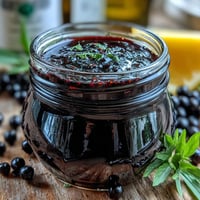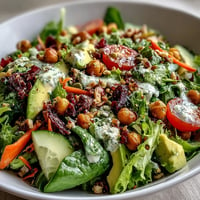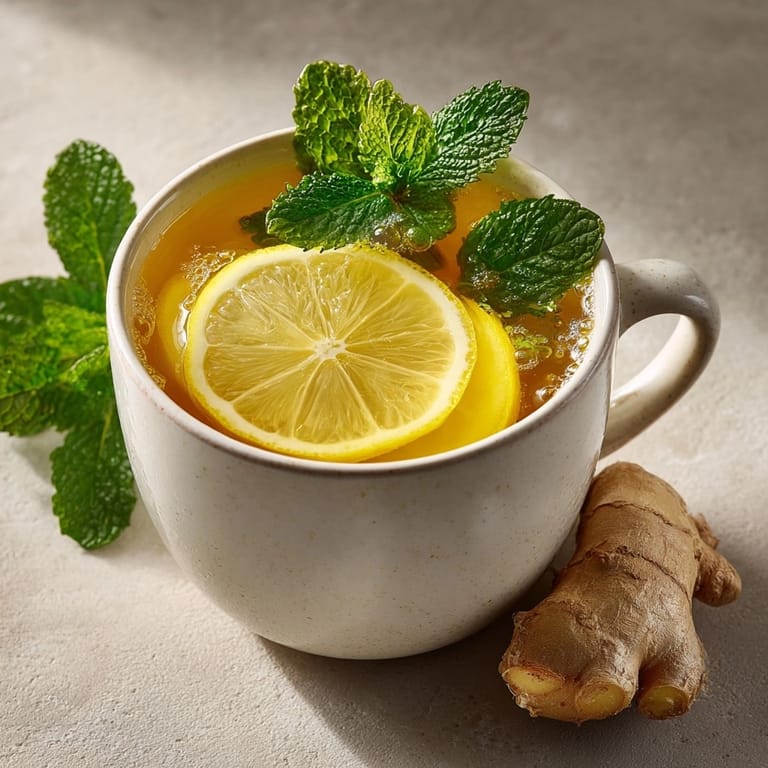 Save
Save This immunity-boosting ginger lemon tea has been my personal remedy through countless cold seasons, offering both comfort and natural support when I need it most. The aromatic combination of fresh ginger and bright lemon creates a soothing experience that warms from within while delivering powerful antioxidants to your system.
I first discovered this tea recipe during a particularly nasty bout of flu several years ago. What began as a desperate attempt to find relief has since become my daily morning ritual during the colder months, and my family now requests it at the first sign of sniffles.
What's for Dinner Tonight? 🤔
Stop stressing. Get 10 fast recipes that actually work on busy nights.
Free. No spam. Just easy meals.
Ingredients
- Fresh ginger root: provides natural anti-inflammatory properties and gives the tea its distinctive warming quality. Look for firm pieces with smooth skin.
- Lemon juice: adds bright citrus notes and vitamin C. Choose lemons that feel heavy for their size and have a slight give when squeezed.
- Filtered water: forms the clean base for your tea. Using filtered water ensures no chlorine or mineral tastes interfere with the delicate flavors.
- Raw honey or maple syrup: adds natural sweetness that balances the spicy ginger and tart lemon. Local honey is ideal for additional seasonal allergy benefits.
- Optional turmeric: introduces additional anti-inflammatory properties and a golden color. Select fresh roots that are firm and unblemished.
- Black pepper: enhances the absorption of curcumin in turmeric by up to 2000 percent. Just a tiny pinch makes all the difference.
- Fresh mint leaves: provide a cooling finish and digestive benefits. Look for bright green leaves without any wilting.
Tired of Takeout? 🥡
Get 10 meals you can make faster than delivery arrives. Seriously.
One email. No spam. Unsubscribe anytime.
Instructions

- Prepare the Base:
- Bring filtered water to a gentle simmer in a small saucepan. Avoid a rolling boil as this can make the tea taste bitter. The ideal temperature is just when small bubbles begin forming around the edges of the pan.
- Infuse the Ginger:
- Add your thinly sliced ginger to the simmering water. The thinner you slice the ginger, the more flavor it will release. Reduce the heat to low and allow it to simmer gently for 8 to 10 minutes. During this time, the water will take on a golden hue and the spicy aroma of ginger will fill your kitchen.
- Add Turmeric if Using:
- If you're incorporating turmeric, add it alongside the ginger. The combination of these two roots creates a powerhouse of anti-inflammatory compounds. Simmer together with the ginger for the full duration to extract maximum benefits.
- Finish the Tea:
- Remove the pan from heat completely. This is the perfect moment to add your lemon juice. Adding it away from heat preserves the vitamin C content that would otherwise be diminished by high temperatures. Stir in your sweetener of choice while the tea is still hot enough to dissolve it completely.
- Strain and Serve:
- Pour the tea through a fine mesh strainer into your waiting mugs. The strainer will catch all the ginger and turmeric pieces while allowing the flavorful liquid to pass through. For an elegant presentation, add a fresh slice of lemon and a few mint leaves to each mug just before serving.
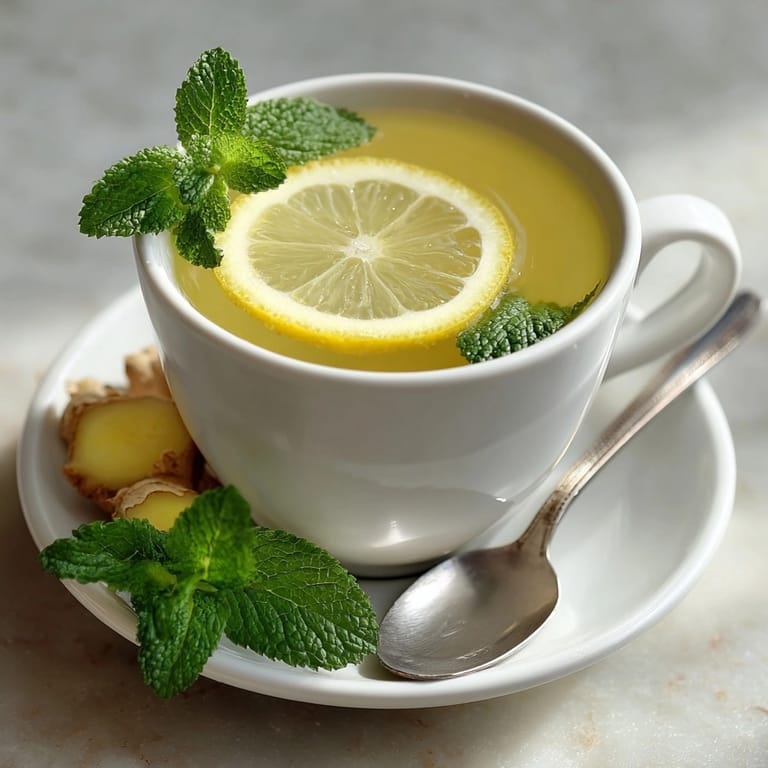 Save
Save The fresh ginger is truly the star of this recipe. I discovered its remarkable potency during a trip to Southeast Asia, where it was served in nearly every home I visited during cold season. The locals taught me that the oils closest to the skin contain the most beneficial compounds, so I now gently scrape the skin rather than peeling it completely away.
Still Scrolling? You'll Love This 👇
Our best 20-minute dinners in one free pack — tried and tested by thousands.
Trusted by 10,000+ home cooks.
Seasonal Adaptations
Summer Refresh
During warmer months, this tea transforms beautifully into a cooling beverage. Make the tea as directed, then refrigerate until completely chilled. Serve over ice with additional fresh lemon slices and a sprig of mint for a revitalizing summer drink that still delivers all the immune benefits. The cold version pairs wonderfully with summer meals and provides hydration with benefits.
Winter Comfort
In the depths of winter, enhance the warming qualities by adding a cinnamon stick and two cloves during the simmering process. These warming spices complement the ginger perfectly while adding their own antioxidant properties. For especially cold days, a tiny pinch of cayenne pepper creates a pleasant heat that warms from within and helps stimulate circulation.
Spring Cleanse
As seasons transition, incorporate fresh herbs like thyme or rosemary for added respiratory support. These herbs contain natural compounds that help clear congestion and support lung health during allergy season. Add a teaspoon of local honey to help build immunity to seasonal pollens.
Storage Tips
This immunity tea can be made in larger batches and stored in the refrigerator for up to three days. Keep it in a sealed glass container to preserve the flavors and beneficial compounds. When ready to enjoy, gently reheat only the portion you plan to drink rather than the entire batch repeatedly.
The concentrated tea base can also be frozen in ice cube trays. Simply pop out a few cubes and add hot water for an instant immunity boost when you feel the first signs of illness coming on. This method preserves all the beneficial compounds and makes the tea accessible even when you lack the energy to prepare it from scratch.

Cultural Significance
Ginger tea variations appear in traditional medicine systems worldwide, from Chinese medicine to Ayurveda. In many Asian cultures, ginger tea is considered a foundational health tonic, often prescribed for everything from digestive issues to cold prevention. The addition of lemon reflects Mediterranean and Middle Eastern traditions, where citrus has long been valued for its vitamin content and brightening flavor.
Throughout history, these ingredients have been treasured not just for flavor but for their healing properties. Modern science now confirms what traditional healers have known for centuries about the anti-inflammatory and immune-supporting properties of these simple ingredients.
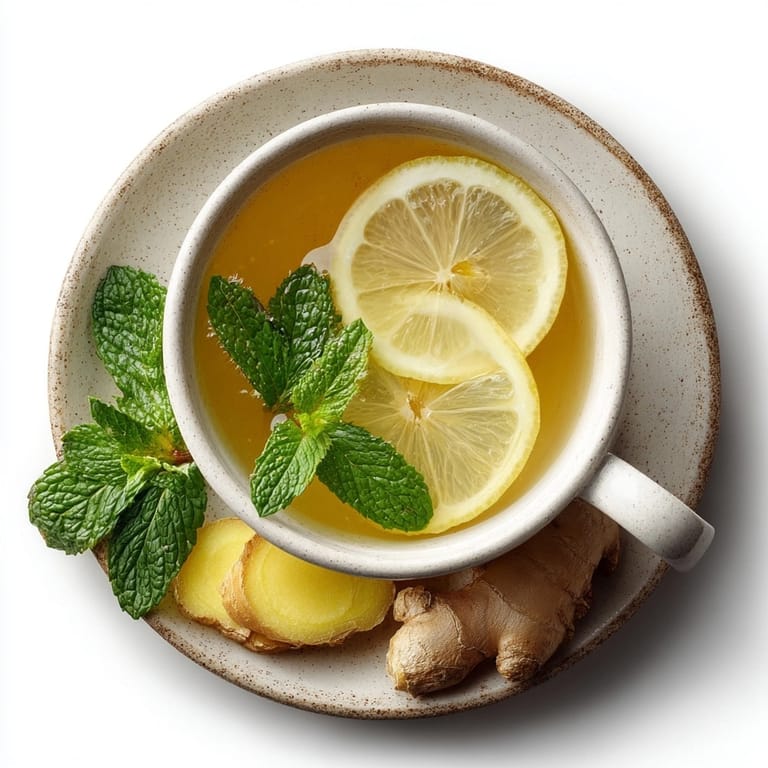 Save
Save This recipe is a simple yet effective way to support your well-being. Enjoy the comforting warmth and invigorating flavors as you boost your natural defenses.
Recipe Questions & Answers
- → How can I intensify the ginger flavor?
Use more ginger slices or steep for a few extra minutes to deepen the zesty kick and warmth in your drink.
- → Is this drink suitable for vegans?
Absolutely—just swap honey for maple syrup or another plant-based sweetener to keep it vegan-friendly.
- → Can I use lime instead of lemon?
Yes, lime juice offers a refreshing twist and pairs well with the ginger, creating a slightly different citrus profile.
- → What benefits do optional turmeric and black pepper add?
Turmeric brings earthy flavor and extra nourishment, while black pepper can enhance turmeric's absorption and add subtle spice.
- → Can this beverage be served cold?
Definitely—let it cool and pour over ice for a refreshing alternative, perfect for warm weather or post-workout hydration.
- → What tools do I need to prepare this?
You'll need a small saucepan, fine mesh strainer, citrus juicer (if handy), measuring spoons, and mugs for serving.
